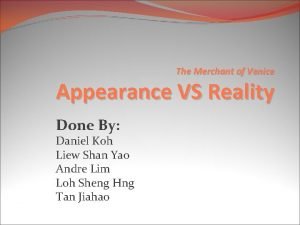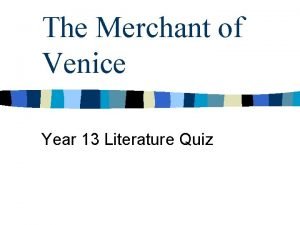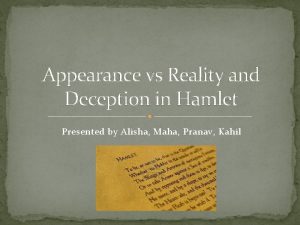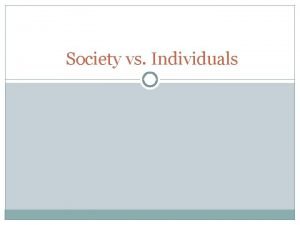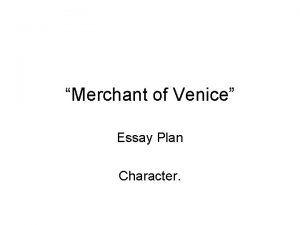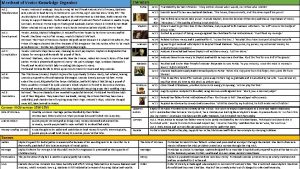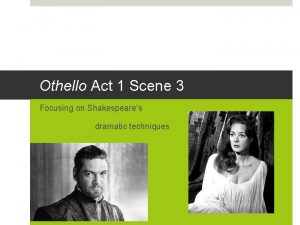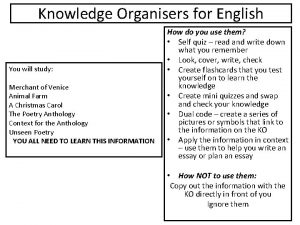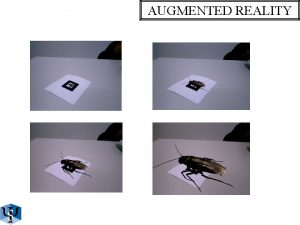The Merchant of Venice Appearance VS Reality Done
















- Slides: 16

The Merchant of Venice Appearance VS Reality Done By: Daniel Koh Liew Shan Yao Andre Lim Loh Sheng Hng Tan Jiahao

Contents Page Definition of Key Concepts Appearance VS Reality in: Casket Scenes Jessica’s Elopement Portia’s Cross-Dressing Shylock’s Deception Relevance / Significance

Definition of Key Concepts Compact Oxford Dictionary defines: Appearance as the way that someone or something looks or seems Reality as a thing that is actually experienced or seen / the quality of being lifelike In our terms, Appearance is what you see, which might not necessarily be actual Reality is the actual look / essence / behaviour of a particular thing or charcter

Casket Scenes “All that glitters is not gold – Often have you heard that told. Many a man his life hath sold But my outside to behold. ” - Act 2, Scene 7, Lines 65 – 68 Although gold is shiny, what really “glitters [might] not [be] gold”. Similarly, “my outside” might cause “a man[‘s] life [to be] sold”, showing that the appearance of something, might not be what the essence of it might be. What matters is the reality of the object, not the appearance

Casket Scenes “Some there be that shadows kiss; Such have but a shadow’s bliss” - Act 2, Scene 9, Lines 66 to 67 The “shadows kiss” signifies the embracing of illusions rather than the reality, and also of someone’s image, rather than his true self, or his true “bliss”. Appearance of “bliss” / happiness, not the reality

Casket Scenes “So may the outward shows be least themselves; The world is still deceived with ornament In law, what pleas so tainted and corrupt, But seasoned with a gracious voice, Obscures the show of evil? ” - Act 3, Scene 2, Lines 73 to 77 There are things that are deeper in life than what “the outward shows” and people everywhere are lead by false appearances. An example being a lawyer can justify what is wrong with sweet false appearances.

Jessica’s Elopement “To see me thus transformed into a boy” - Act 2 Scene 6 Line 39 “In the lovely garnish of a boy” - Act 2 Scene 6 Line 45 She dressed up as a boy so as to escape the attention of other when she elopes with Lorenzo.

Jessica’s Elopement “Must I hold a candle to my shames” - Act 2 Scene 6 Line 41 “I should be obscured” - Act 2 Scene 6 Line 44 Her disguise also hid her shame from eloping with a Christian.

Portia’s Cross-Dressing Portia dressed as a man so as to help her husband Bassanio, save his best friend Antonio. This is ironic, because at that time, female characters were played by men, or boys. The fact that a male character has to play a female character acting as a male character is ironic

Portia’s Cross-Dressing Evidence Act 5 Scene 1, Lines 269 -271: - “There you shall find that Portia was the doctor, Nerissa there her clerk. Lorenzo here Shall witness I set forth as soon as you. ”

The Bond Portia, when playing the part of the lawyer, made Shylock believe that his bond was foolproof, making him stick to his bond, before turning it around on him, trapping him in his own cage. Portia uses the foolproof appearance of the bond to trick Shylock into believing it actually is foolproof, yet in reality, it isn’t

Portia – Lawyer/Wife Portia appears as a lawyer, although she is just Bassanio’s wife. Those who do not know this see the lawyer and Portia as 2 different people, and they did not associate Portia with the role of the hero. However, in reality, Portia is the one who saves the day, although in reality she isn’t a lawyer.

Shylock’s Deception In act 1 scene 3, Antonio wants to borrow a loan from Shylock agrees to the bond, under the condition that Shylock gets a pound of Antonio’s flesh for each pound he cannot return. Shylock also describes the bond as a “merry bond”. A merry bond is defined as an unserious bond, a very happy and flexible bond, where everyone expects Shylock to be understanding to Antonio when he cannot return the loan on time. Shylock seems to have created this bond without interest due to his love and friendship for Antonio, as he states: “I would be friends with you, and have your love…” Shylock continues to flatter Antonio like “Antonio is a good man” and wants to be friends with him. Appearance only

Shylock’s Deception However, Shylock’s real intention is to "catch him once upon the hip, I will feed fat the ancient grudge I bear him, ” and to get a pound of flesh from Antonio, which in other terms to kill him. As Antonio “hates our sacred nation”, which means he hates Jews, Shylock uses deception to lure Antonio into his deadly trap. “He hath disgraced me and hindered me half a million, laughed at my losses, mocked my gains, scorned my nation, thwarted my my bargains, cooled my friends, heated my enemies- for what reason- I am a Jew. ” Here is the reason that Shylock states that why he wants to kill Antonio and despised him, as he looked down on Jews and treated them like animals. Real reason (reality) of treating Antonio well in Act 1 Scene 3

Relevance / Signigifcance Have came in the forms of Lies Deception Disguise Trickery Uses: Thickens the plotline Makes it more engaging and exciting Create the mood and atmosphere of suspense Some use of dramatic irony (boy playing as a woman, playing as a man, in Portia and Jessica’s case)

The Merchant of Venice Appearance VS Reality Thank you for your kind attention.
 Merchant of venice appearance vs reality quotes
Merchant of venice appearance vs reality quotes What does bassanio offer the young lawyer who saves antonio
What does bassanio offer the young lawyer who saves antonio Deception in hamlet
Deception in hamlet Individuals vs society
Individuals vs society Guilty minds
Guilty minds Macbeth themes
Macbeth themes Count palatine merchant of venice
Count palatine merchant of venice Shylock's servant
Shylock's servant Merchant of venice introduction essay
Merchant of venice introduction essay Merchant of venice knowledge organiser
Merchant of venice knowledge organiser Iago's soliloquy act 1 scene 3
Iago's soliloquy act 1 scene 3 Plots in merchant of venice
Plots in merchant of venice The merchant of venice essay
The merchant of venice essay Merchant of venice act 4 scene 1 multiple choice questions
Merchant of venice act 4 scene 1 multiple choice questions William shakespeare thesis statement
William shakespeare thesis statement Merchant of venice knowledge organiser
Merchant of venice knowledge organiser Literary devices in the merchant of venice
Literary devices in the merchant of venice
